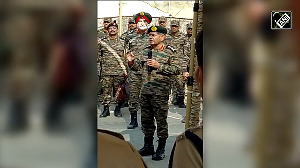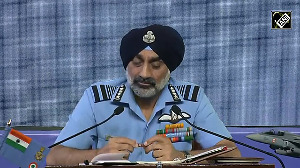In a statement issued shortly after signing the Henry J Hyde US-India Peaceful Atomic Energy Cooperation Act on Monday, Bush indicated that he did not agree with provisions like Section 103 and Section 104 (d) (2) in the legislation.
"Section 103 of the Act purports to establish US policy with respect to various international affairs matters. My approval of the Act does not constitute my adoption of the statements of policy as US foreign policy.
"Given the Constitution's commitment to the presidency of the authority to conduct the nation's foreign affairs, the executive branch shall construe such policy statements as advisory," Bush said.
Section 103 suggests that the US would oppose development of a capability to produce nuclear weapons by any non-nuclear weapon state within or outside the Nuclear Non-Proliferation Treaty regime.
The section also says that the US would work with Nuclear Suppliers Group members to further restrict transfers of equipment and technologies related to uranium enrichment, reprocessing of spent nuclear fuel and production of heavy water to all countries, including India.
The US government will also seek to prevent transfer of these equipment and technologies from other members of NSG or from any other source if the transfers are suspended or terminated.
Section 104 (d) (2) says that no item subject to transfer guidelines of NSG may be transferred to India if such transfer would be inconsistent with the guidelines in effect on the date of the transfer.
These aspects in the bill are being seen with concern in India, leading to demands there that the agreement be terminated.
The statement said section 104 (d) (2) of the Act were "...construed to prohibit the executive branch from transferring or approving the transfer of an item to India contrary to Nuclear Suppliers Group transfer guidelines that may be in effect at the time of such future transfer, a serious question would exist as to whether the provision unconstitutionally delegated legislative power to an international body.
"In order to avoid this constitutional question, the executive branch shall construe section 104(d)(2) as advisory.
The executive branch will give sections 103 and 104 (d) (2) the due weight that comity between the legislative and executive branches should require, to the extent consistent with US foreign policy," Bush said.
"The executive branch shall construe provisions of the Act that mandate, regulate, or prohibit submission of information to the Congress, an international organisation, or the public, such as sections 104, 109, 261, 271, 272, 273, 274, and 275, in a manner consistent with the President's constitutional authority to protect and control information that could impair foreign relations, national security, the deliberative processes of the Executive, or the performance of the Executive's constitutional duties," Bush said.





